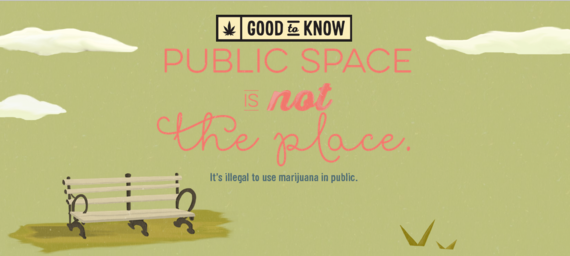The Colorado Department of Public Health & Environment is working to raise public awareness of the state's marijuana laws, but banning marijuana cafes leads people to use in public spaces.
Colorado and Washington were the first two states to adopt marijuana legalization, and it's been a resounding success. Tens of millions of new tax dollars can now be spent on education and other important needs, police can focus their limited resources on serious crimes, and the huge surges in marijuana use that opponents warned of have failed to materialize. Alaska and Oregon will soon have legal marijuana industries of their own, and can expect similar positive effects. But this isn't to say there aren't any downsides -- while legalization has undeniably been a net benefit, the states leading the way are providing lessons for others looking to follow suit. One of the biggest lessons is that states looking to curb public smoking must allow marijuana cafes, not just dispensaries.
Colorado has a much more developed marijuana market than Washington, as a robust state-regulated medical program existed for many years before adult use was legalized. Dispensaries began selling to all adults in January 2014, and while it hasn't led to a population of zombies or turned the roads into a demolition derby, more people have been getting caught smoking in public. In 2013, when marijuana was legal to possess but stores had not yet opened, Denver police wrote 184 citations for public consumption. In 2014, that more than tripled to 770.
Part of this may be due to ignorance of the law, and future years may see gradual decreases as people learn that smoking in public is still illegal. But this surge in public consumption is also a result of Colorado's policies, which give people many places to purchase marijuana but very few, if any, to consume it. The law prohibits consumption in public places -- including not just parks and other government property, but private facilities like restaurants or concert halls that are open to the public -- effectively meaning people can only legally use marijuana in their homes.
But what if a Coloradan wants to smoke before going out to the movies or to dinner, and doesn't want to drive right after? What if a tourist purchases some marijuana to try while in the state, but their hotel doesn't allow smoking in rooms? Many, rather than driving high or breaking a hotel's rules, decide to smoke in parking lots, public parks, or on the sidewalk, all of which are still illegal.
If there were cafes where people could buy and use marijuana on the premises -- essentially a bar, compared to dispensaries being the equivalent of liquor stores -- people would have a venue to safely consume marijuana away from children and those who aren't interested in being around it. This could more effectively keep marijuana users from consuming in public, just like the vast majority of alcohol users drink at bars and restaurants rather than public parks or other places where it's prohibited.
While marijuana cafes aren't currently legal in any states, there are some serious proposals to allow them. For example, a bill in the Massachusetts state legislature that would legalize marijuana for adult use also establishes special licenses for marijuana cafes, which can also serve food but aren't allowed to sell alcohol. These businesses would not only help reduce public marijuana consumption, but also serve as an important draw for visitors from neighboring states. Tourists would come for the cafes and stay for movies, plays, or other entertainment, invigorating the state's economy and bringing in additional tax revenue.
As majorities of both supporters and opponents agree, marijuana legalization is inevitable. But the specifics matter, and with each jurisdiction approaching legalization in slightly different ways, there are many opportunities to learn what works and what doesn't. As Supreme Court Justice Louis Brandeis once said, the states are laboratories of democracy. These early experimental results indicate that allowing cafes is an important part of a sensible marijuana policy.

